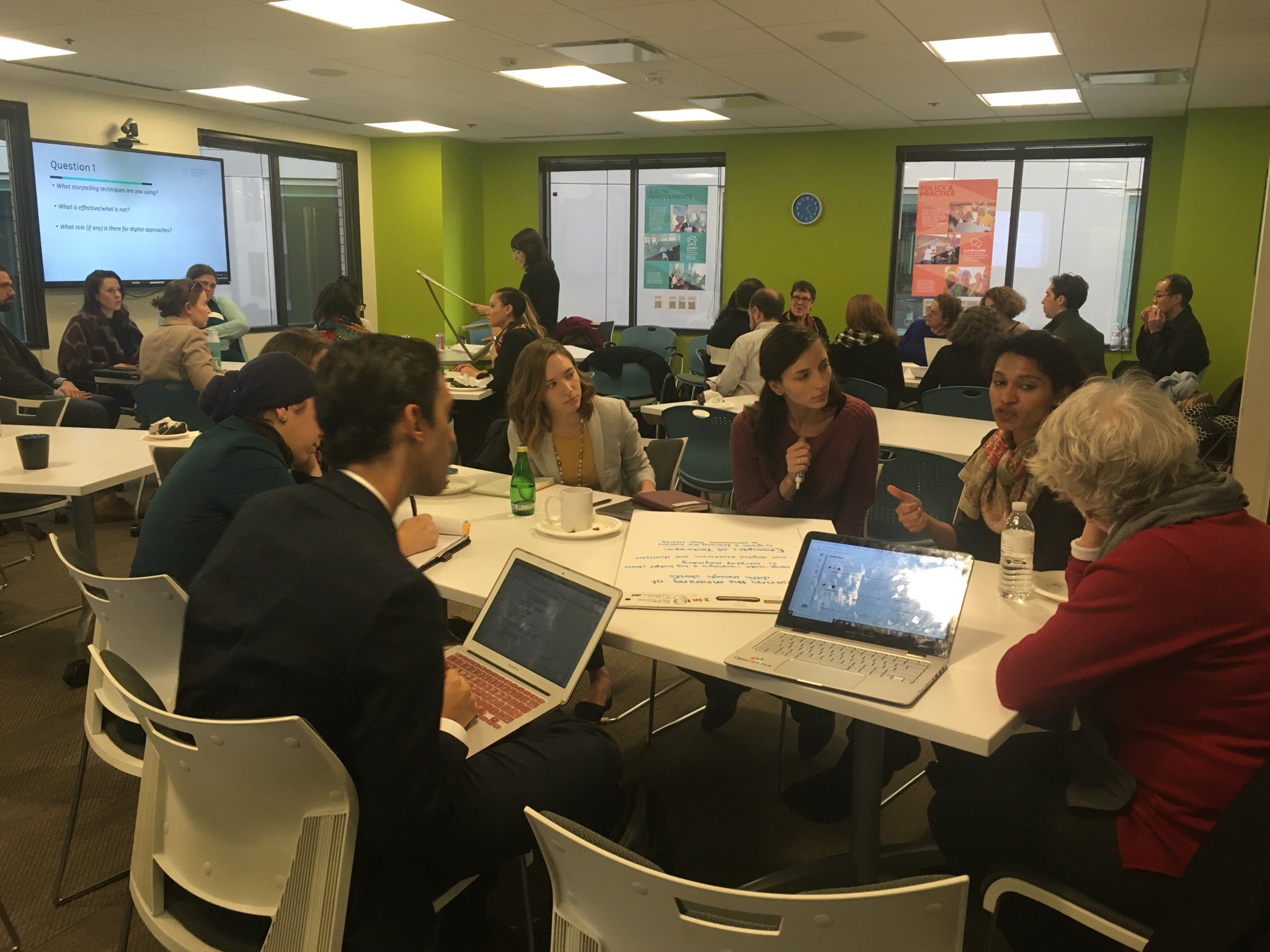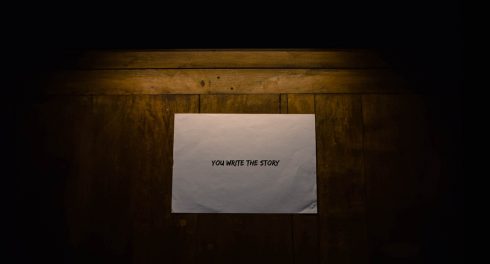Highlight:
- Synthesize me
- Too much of a good thing?
- Mind the gap
- Overly familiar
- Manel alert
- TAI Spotlight: Supporting local efforts to increase data use in Colombia’s extractives sector
In case you missed it…
You can read the TAI Weekly in translated versions! Simply click the “Translate” button located at the top right-hand corner when you view the newsletter directly on Mailchimp via “Read More” links below.

Image: Clay Banks on Unsplash
Synthesize me
Null findings do not mean no learnings. Quite the contrary, as Sue Cant and Eric Sarriot note as they pull out common lessons for social accountability practice in mixed evidence from the health sector. They identify the role of high-quality community-based facilitators, the value of collaborative approaches, and its contribution to system strengthening and relationship building. Their blog was out just in time to feed into discussions at the Global Partnership for Social Accountability Forum last week where the health sector seemed more prominent than usual. Sue and Eric also call for more syntheses of evidence for practitioners and in that regard you may want to track the Movement for Community Led Development – over sixty organizations coming together to align learning efforts and working on a meta-synthesis of close to 400 submitted evaluations of community led development projects.
The theme of this year’s Forum was inclusion, so we are pleased to support the grant making facility Voice in a new $1m call for ideas on open to inclusive governance. This seeks to resource those representing typically marginalized groups to take advantage of transparency and accountability tools in furthering their rights. (For an insight on how to do effective disability-inclusive grantmaking from OSF, see the TAI Spotlight below).
Learn how Zambian Governance Foundation for Civil Society reinvents community philanthropy for social accountability outcomes by harnessing the pre-existing monetary and non-monetary resources to advance development prospects at community level.
Returning to syntheses, TAI also appreciated the chance to hear in person the latest findings of the Action for Empowerment and Accountability project. See here for summary messages on promoting accountability in more fragile settings. More interesting research now getting underway in phase two. Pair with the CARE team’s cases digging into how social norms affect inclusive governance in fragile & (post) conflict-affected areas.
Too much of a good thing?
In such contexts, government transparency is often sorely lacking, but what of contexts where insistence on transparency might undermine quality decision making? Steven Aftergood worries about demands for transparency being used to obfuscate. His argument? Transparency cannot be an end to itself. It can either be used as a tool for democratic decision making or as a weapon of deception and disinformation. This recalls TAI’s Distract, Divide, Detach report and David Pozen’s recently featured article in the Weekly. That said, our experience is there is much more realism from transparency proponents these days and sensitivity to the potential to it being manipulated in opposition to accountability.
How should individuals think of transparency of their own data? Can governments be trusted custodians? Rana Foroohar wonders if public databases regulated by elected governments can solve some of the personal data protection concerns. Diane Coyle notes the difficulty of getting to the “true” value of data, but worries that new public data assets are being privatized worldwide before people are aware they exist. She reinforces the chorus for new approaches on data governance. “Digitalisation means the realm of data covers the whole of society. Governments must not abdicate responsibility for its management.” Meanwhile Lori Hall at MicroFocus takes it to the organizational level, explaining why individual institutions need a data governance framework.
Perhaps, in time as the data governance issues and options get clarified, countries might want to consider a citizen assembly to inform policy development? Such assemblies are all the rage these days, but not all are alike. What makes for an effective citizen assembly? Tim Hughes thinks it’s time to set some standards.
Remember the WhatsApp hack on dozen of NGO activists, journalists, and political dissidents we told you about earlier this month? 121 Indians were also reportedly targeted and WhatsApp has told the government it doesn’t know the full extent of the spyware attack. R K Vij, a Senior IPS officer, says it is time for the government to pass the Personal Data Protection Bill into law to protect the vulnerability of personal data. In the wake of such instances, Amnesty International in a new report calls for a radical transformation of Facebook and Google’s core business model, while British actor and comedian, Sacha Baron Cohen also takes a dig at social media bigwigs. What can you do to self-protect? Learn from these takeaways by a journalist from a digital security training.
Meanwhile, the Mayor of New York City has created the role of an “Algorithms Management and Policy Officer” to help guide agencies in “the fair and responsible use of [algorithmic] tools,” including a protocol for public input. Notably, law enforcement systems are exempt. Wonder how long it will take for other major cities to create similar roles.
Mind the gap

Larry Summers and Natasha Sarin estimate that the US will fail to collect $7.5trillion of taxes due in the next decade (although currently absent investment in audits could close a significant portion of this gap.) For lower income countries the gap between tax owed under the law and what ends up in state treasuries is typically even larger proportionally. Dina Pomeranz and Jose Vila-Belda dig into this, noting the inability of authorities to obtain reliable information about the amount of taxes that are due, but also contributing weaknesses of legal enforcement capacity, political constraints, corruption, tax morale and ease of tax payment. They end with a welcome call for more research at the interplay of politics and power in taxation.
Meanwhile, the OECD digital tax’s proposals saga continues as Ben Dickinson defends the OECD process as being inclusive of the 135 countries involved while Alison Christians fears the powers that be will overly influence the push for a compromise at unreasonable haste.
Still want resources on how to strengthen tax systems in a digital world? The World Bank has posted videos of all the sessions from its events last month as well as a helpful (and lengthy) list of resources plus a bonus section on tobacco taxes. On that point, check out Ruth Lopert’s list of organizations and research initiatives currently addressing taxation of “the bads” – tobacco, alcohol, and sugar-sweetened beverages to help navigate the landscape of existing research and identify gaps and opportunities for further work.
ESSENTIAL LISTENING: Taxes and Inequality
Gabriel Zucman, an economics professor at the University of California, Berkeley, discusses wealth and inequality in America with Tax Notes contributing editor Nana Ama Sarfo.
Overly familiar
Learning the tricks of the trade a little too well? A professor who wrote a book on drug crime is now accused of money laundering. Perhaps he should have learned from the best. Transparency International shed more light on how UK service providers, including prestigious educational institutions, helped some of the world’s most corrupt move, hide, and defend their illicit wealth.
The Financial Times suggests that Mexican government might be the latest to be politicizing the fight against corruption, noting inconsistencies in Andrés Manuel López Obrador’s targets for investigation. In South Africa, post-Zuma graft crackdown continues with the arrest of the former security minister while corruption.
Two Namibian ministers and the boss of Iceland’s biggest fishing company resigned over alleged bribes paid in exchange for trawling rights. Meanwhile, some in Ghana might be rubbing their hands over potential rents from a new significant oil discovery. In the immediate term, a boost for national pride that a Ghanaian firm with no history of deep-sea exploration made a find in a block relinquished by US firm Kosmos.
Also, don’t miss Accountability Counsel’s new tool which pulls together comprehensive data on all human rights and environmental complaints filed with Independent Accountability Mechanisms around the world.
LONG READ Foundation Horizon Scan: Taking the long view
The new report by Nesta explores strategic and operational challenges foundations and grant-giving organizations will face over the next decade in order to maintain their legitimacy and impact. Nesta also has an interesting take on the philanthropy ecosystem. Find out if your foundation is “a stabilizer”, “a modernizer” or “a transformer.”
Manel alert

Participants share ideas at a breakout session during the Storytelling and the future of Advocacy event at the OpenGov Hub last week Thursday.
We didn’t see any male only panels (“manels”) at the GPSA Forum this past week, but what to do if faced with a “last-minute manel”? The Open Heroines have a guide for that, although the simplest solution might to be move away from panel formats full stop. Want inspiration for other formats? Check out the updated Open Gov Guide to Great Events.
Valerie Threlfall and June Wang asked if feedback work promotes equity. Yes, if done well as “high-quality feedback, fully embraced, offers a productive path towards greater inclusion and equity.” Don’t miss this design sketch for collaboration practitioners by Eugene Eric Kim. Plus, check out this reference guide on understanding social norms and explore how to better fund networks that threaten the status quo.
Finally, great turnout for a session on storytelling and the future of advocacy at the Open Gov Hub last week, which provided further inspiration to ready the new report from Fund for Global Human Rights and JustLabs that lays out series of narrative strategies for human rights funders, activists, and civil society to transform narratives about human rights. Browse through our twitter feed to see how the session unfolds plus advice from practitioners on effective ways to tell effective advocacy stories in a world of narrative bubbles, disinformation campaigns and short attention spans.
TAI Spotlight: Supporting local efforts to increase data use in Colombia’s extractives sector
Supporting Local Efforts to Increase Data Use in Colombia’s Extractives Sector | Transparency and Accountability Initiative (TAI)
In the second part of our blog on Exploring Barriers to Data Use in Colombia’s Mining Sector, we reveal how members such as Ford Foundation and Open Society Foundations are extending their support to local partners in Columbia to develop projects on improving data use in the extractives sector. The goal is to sharpen the impact of royalties, as well as strengthen and coordinate civil society demands for accountability in how they are allocated and spent.
A Legacy of Impact | MacArthur Foundation
Explore the Foundation’s timeline and see a list of grantees that have been helping to build a more just, verdant, and peaceful world.
Darren Walker joins Influencers with Andy Serwer | Ford Foundation
Darren Walker talks with Yahoo Finance Editor-in-Chief, Andy Serwer, on the impact of inequality on the American Dream. “My concern is their dreams & their aspirations are being asphyxiated by a kind of pernicious inequality that makes it impossible for them to believe in the American dream & when the American dream dies, America dies,” he says.
How Foundations Can Lead on Disability-Inclusive Grantmaking | Open Society Foundations
Rachele Tardi, senior program manager and Zachary Turk, a program officer with the Youth Exchange at Open Society Foundations shares some lessons from Open Society’s Youth Exchange on how grant makers can help break down those barriers and make their work more inclusive.
$20 million Group Initiative Supports women’s funding organizations | Hewlett Foundation:
Just Society, the Open Society Foundations, Wellspring Philanthropic Fund, and the William and Flora Hewlett Foundation have designed a five-year initiative to provide at least $20 million in a combined grantmaking initiative to strengthen women’s funding organizations around the world that advance the rights and opportunities of women, girls, and LGBTQI people.
Digital Rights: The new frontier of Human Rights? | Luminate
Martin Tisné was at the Trust Conference speaking on the use of data and its collective impact on the society. According to him, “The same technologies that were being used for ‘liberation and empowerment’ during the Arab Spring are now being used by authoritarian regimes to “surveil citizens and crack down on civil liberties.
Calls and job listings
BetterTogether Challenge for innovators – Ongoing
Co-Impact Director of Programs and Learning – Ongoing
Managing Director of Programs and Learning – Ongoing
Democracy Fund: Sr. Associate, Strategy & Learning – Ongoing
Small Charities Challenge Fund for UK registered NGOs and Charities – November 28, 2019
Technology Support Manager at Open Society Foundations, New York – November 28, 2019
Civic Space Intern at Open Society Foundations, Barcelona – November 28, 2019
Latin America Regional Manager at The Engine Room – November 30, 2019
Research Coordinator at the Engine Room – November 30, 2019
Technology for Integrity: US-Russia Anti-corruption Exchange – November 30, 2019
WinterSchool for Thinktankers 2020 – December 1, 2019
Project Manager, The Henry J. Leir Institute – The Fletcher School – December 9, 2019
TAI Photo Grant – January 13, 2020
$2.5 million support for 32 partner research projects on health, water and sanitation, agriculture, and economic growth in developing countries – February 10, 2020
From Open to Inclusive Government: Global Innovate and Learn grant – February 14, 2020
Amartya Sen Essay Contest 2020: Illicit financial flows – August 31, 2020
Calendar
The Story Conference – November 27 – 29, 2019 (Melbourne, Australia)
Strengthening Human Rights Through Youth Engagement – December 10, 2019 (Washington, DC)
The Impacts of Civic Tech Conference (TICTeC) – March 24 – 25, 2020 (Reykjavik, Iceland)
Transparency International: 19th International Anti-Corruption Conference – June 2 – 5, 2020 (Seoul, South Korea)
Women and Girls Africa Summit – June 9-12, 2020 (Durban, South Africa).


